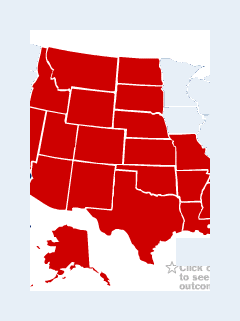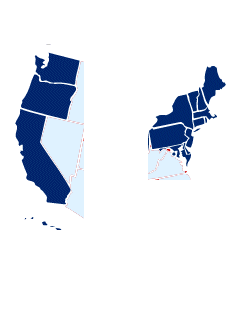Do you believe that the local situation in Montana should be the basis for deciding gun policies in New York City or other major cities?
Unfortunately, when the Semi-Automatic Assault Weapons Ban expired, that is exactly what happened.
Over many years, the National Rifle Association worked tirelessly to convince hunters and gun owners that legislation controlling semi-automatic weapons, like the Uzi or the AK-47, was just the first step in some long-term conspiracy to eventually take away even their hunting rifles.
Most of the NRA's constituency can be found in rural and less-populated parts of the country, while those supposedly leading this conspiracy were painted as "east and west coast liberals" (representing more densely populated parts of the country where gang violence and gun crime are tangible concerns).
The NRA exploited geographic and cultural divisions, funded and endorsed sympathetic politicians, targeted politicians unsympathetic to their cause, and finally, the NRA got its way. The ban expired in September of this year.
Many rational voices got left in the dust during this relentless NRA campaign, moderate groups like the Brady Campaign to Prevent Gun Violence, as well as most national and local police organizations. Such groups seek reasonable gun laws, not to ban all guns. But the NRA successfully painted a different picture, creating fear in its rural constituency that it was a slippery slope and that their right to own guns was itself at risk.
Now look at the two maps below. One represents states currently considered for Bush, and the other states likely to go for Kerry. While this divide is similar to the 2000 election, it also represents the difference between states with largely rural populations vs. states with large urban and suburban populations (not to mention differing points of view on semi-automatic assault weapons).


So what's the point?
Well, simply, how does all of this relate to the question of terrorism, widely characterized as the most important issue in the presidential campaign? Presumably, the red states are confident that George W. Bush has made good decisions in fighting terrorism, and that we are safer today because of his policies. And presumably, the blue states have come to another conclusion.
Could it be that people in the red states totally buy into Bush's tough talk about terrorism, but that the people in the blue states are making a more complex assessment, not only of Bush's words, but considering the sum total of his policies and their consequences?
Why are people in the blue states choosing Kerry? Because he will be weaker on fighting terrorism? Not likely. The decision to make such claims has been one of the more unfortunate turns of the campaign.
Can the people in the red states really speak for the people in the states that are home to the most urban centers, the most ports and airports, the most chemical and nuclear power plants, in short, the most likely targets of terrorism?
Imagine a social worker telling a battered wife that she needs to stand up to her violent husband at all costs. Doesn't the social worker bear a responsibility to listen carefully to the woman's assessment of the situation and how best to proceed? The goal is to correct the situation, not to talk or act tough out of proportion to the degree of protection that has been established.
This is in no way meant to insult the red states, or to make the divide in our country any worse. But don't people in the red states have an obligation to listen carefully to how people in the blue states are thinking about George W. Bush's leadership in this matter, and perhaps even let them take the lead about how to proceed?
I humbly submit that it is so.
Please share with anybody who is still asking these questions.